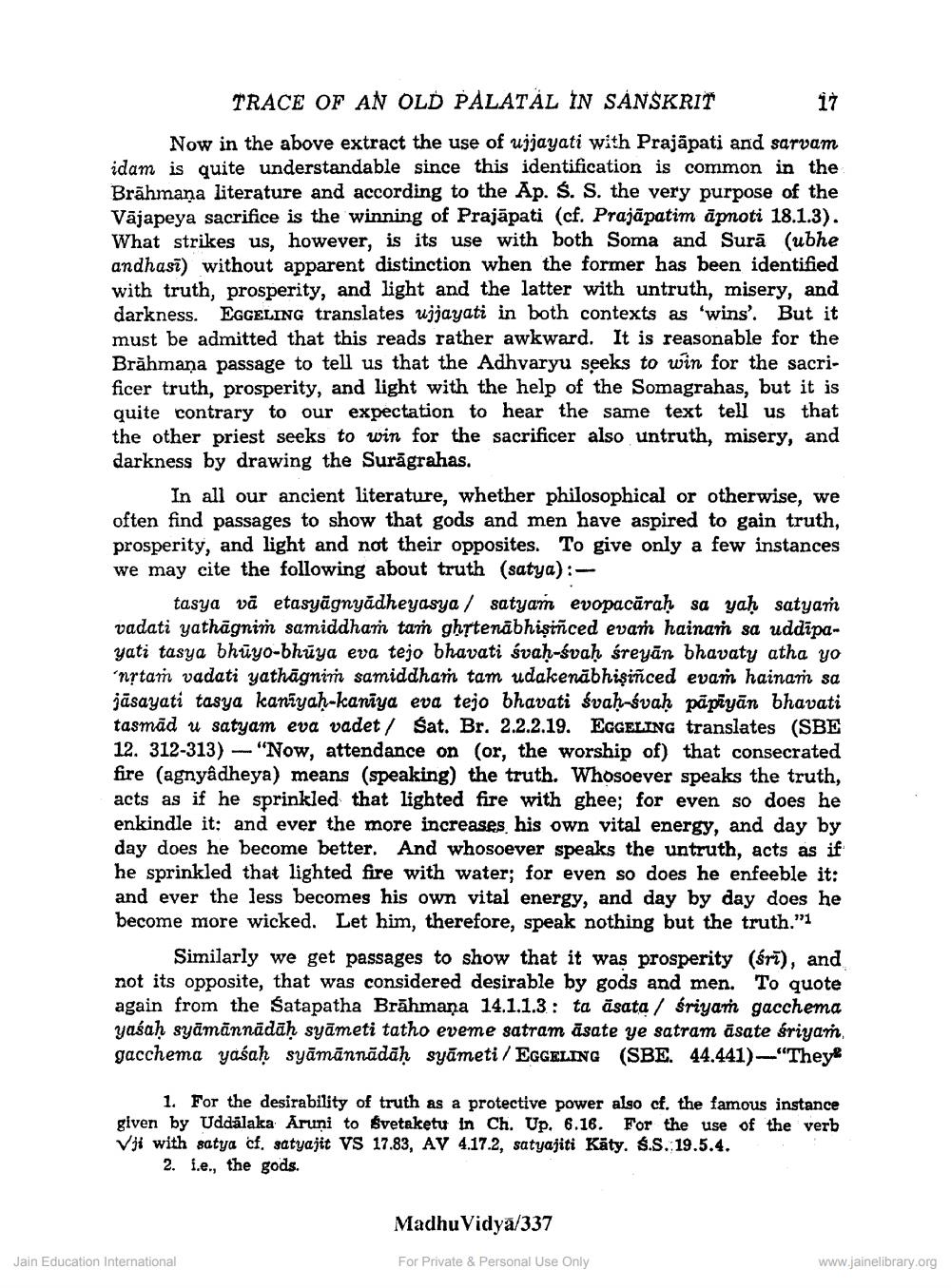________________
TRACE OF AN OLD PALATAL IN SANSKRIT
17 Now in the above extract the use of ujjayati with Prajapati and sarvam idam is quite understandable since this identification is common in the Brāhmaṇa literature and according to the Ap. Ś. S. the very purpose of the Vājapeya sacrifice is the winning of Prajāpati (cf. Prajāpatim āpnoti 18.1.3). What strikes us, however, is its use with both Soma and Surā (ubhe andhasi) without apparent distinction when the former has been identified with truth, prosperity, and light and the latter with untruth, misery, and darkness. EGGELING translates ujjayati in both contexts as 'wins'. But it must be admitted that this reads rather awkward. It is reasonable for the Brāhmana passage to tell us that the Adhvaryu seeks to win for the sacrificer truth, prosperity, and light with the help of the Somagrahas, but it is quite contrary to our expectation to hear the same text tell us that the other priest seeks to win for the sacrificer also untruth, misery, and darkness by drawing the Surāgrahas.
In all our ancient literature, whether philosophical or otherwise, we often find passages to show that gods and men have aspired to gain truth, prosperity, and light and not their opposites. To give only a few instances we may cite the following about truth (satya) :
tasya vă etasyāgnyádheyasya / satyan evopacāraḥ sa yah satyan vadati yathāgnim samiddham tam ghrtenäbhişiñced evam hainan sa uddīpayati tasya bhūyo-bhūya eva tejo bhavati svah-śvaḥ śreyān bhavaty atha yo 'nştan vadati yathāgnim samiddham tam udakenābhişiñced evam hainam sa jāsayati tasya kaniyah-kanīya eva tejo bhavati śvaḥ-śvaḥ pāpīyān bhavati tasmād satyam eva vadet / Sat. Br. 2.2.2.19. EGGELING translates (SBE 12. 312-313) - "Now, attendance on (or, the worship of) that consecrated fire (agnyâdheya) means (speaking) the truth. Whosoever speaks the truth, acts as if he sprinkled that lighted fire with ghee; for even so does he enkindle it; and ever the more increases his own vital energy, and day by day does he become better. And whosoever speaks the untruth, acts as if he sprinkled that lighted fire with water; for even so does he enfeeble it: and ever the less becomes his own vital energy, and day by day does he become more wicked. Let him, therefore, speak nothing but the truth."1
Similarly we get passages to show that it was prosperity (śrī), and not its opposite, that was considered desirable by gods and men. To quote again from the Satapatha Brāhmana 14.1.1.3: ta äsata / śriyam gacchema yaśaḥ syāmānnādāḥ syāmeti tatho eveme satram āsate ye satram āsate sriyan gacchema yaśaḥ syāmānnādāḥ syāmeti / EGGELING (SBE. 44.441)-"They.
1. For the desirability of truth as a protective power also cf, the famous instance given by Uddalaka Aruni to svetaketu in Ch. Up. 6.16. For the use of the verb vji with satya cf. satyajit VS 17.83, AV 4.17.2, satyajiti Käty. $.S. 19.5.4.
2. i.e., the gods.
Madhu Vidya/337
Jain Education International
For Private & Personal Use Only
www.jainelibrary.org




